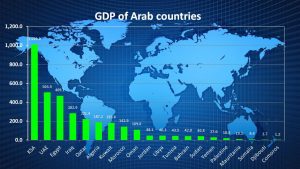On April 19, the International Monetary Fund reduced its forecast for global economic growth during 2022 and 2023 by 0.8% and 0.2% respectively, compared to the update of the global economic prospects in January, by 3.6% in the two years.
In the latest World Economic Outlook report released on April 19 during the Spring Meetings of the Fund and the World Bank, the Fund stated that global growth is also expected to decline to 3.3% in the medium term, while employment and production rates will usually remain below pre-pandemic rates until 2026.
The report attributed the decline in estimates largely due to the Russian-Ukrainian war, which caused a severe setback to the global recovery, slowing growth and increasing inflation rates significantly
Despite the previous forecasts issued last January, which suggested a recovery in the global recovery in the second quarter of this year after a short-term impact of the Omicron mutation, and since then, the outlook has deteriorated due to the war that caused a rise in food prices globally. Moreover, it revealed a lack of recovery of the entire global economy after the pandemic and showed a great contrast between the economic recovery of advanced economies, emerging markets and developing economy.
In addition to the economic fallout from the war on the global economy, the frequent and widespread shutdowns in China have slowed economic activity and created new bottlenecks in global supply chains, and price pressures have caused many countries to tighten monetary policies.
The inflation rate is predicted to remain high for a lengthier period than it was in previous forecasts, driven by the rise in commodity prices due to the war and price pressures, with inflation expected to register at 5.7% in advanced economies and 8.7% in emerging markets and developing economies, up by 1.8% and 2.8% over what was expected in January.
The exacerbation of supply and demand imbalances, including those caused by the war and additional increases in commodity prices are likely to lead to continued high inflation and increased expectations of inflation and wage growth.
































